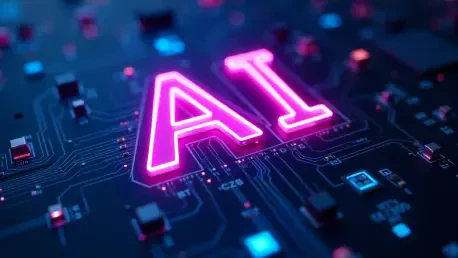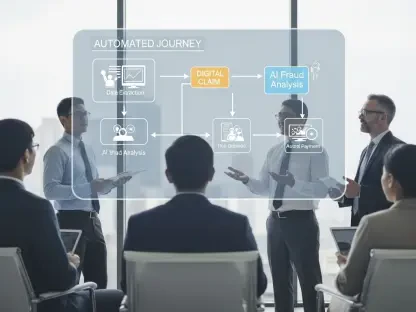In an era where software development cycles are shrinking and cyber threats are escalating, the integration of security into every phase of development has become a critical priority for enterprises worldwide. Imagine a landscape where a single vulnerability can cost millions in damages, yet teams struggle to keep pace with rapid deployment demands. This tension has propelled DevSecOps—a methodology blending development, security, and operations—into the spotlight. As organizations race to innovate, artificial intelligence (AI) emerges as a transformative force, promising to automate complex tasks and fortify defenses. This report delves into how GitLab, a prominent player in the DevSecOps arena, is leveraging AI to reshape the industry, addressing pressing challenges and setting new benchmarks for efficiency and security.
Understanding the DevSecOps Landscape and AI’s Role
The DevSecOps industry stands at the forefront of modern software development, driven by the urgent need to embed security practices into the entire lifecycle of applications. Unlike traditional models where security was an afterthought, this approach ensures that vulnerabilities are caught early, reducing risks and costs. The global market for DevSecOps tools is expanding rapidly, fueled by the increasing complexity of cloud environments and the relentless pace of digital transformation across sectors.
AI has become a game-changer in this space, automating repetitive tasks like code reviews and threat detection while enhancing decision-making through predictive analytics. Its ability to process vast amounts of data in real time allows teams to identify potential issues before they escalate, streamlining workflows and boosting productivity. Major players such as GitHub, Atlassian, and GitLab are investing heavily in AI-driven solutions, recognizing that automation is key to staying competitive in an environment where speed and safety are non-negotiable.
Beyond individual tools, enterprise software solutions are shaping the broader ecosystem, offering integrated platforms that unify development, security, and operations. Technological advancements like machine learning algorithms and natural language processing are being harnessed to improve collaboration and compliance. As these innovations gain traction, they underscore the critical role of scalable, secure systems in meeting the demands of modern businesses, positioning AI as an indispensable ally in the DevSecOps journey.
GitLab’s Strategic Vision for AI-Driven DevSecOps
Leadership Changes as a Catalyst for Innovation
GitLab has recently fortified its executive team with strategic appointments that signal a bold commitment to AI integration. Manav Khurana, named Chief Product and Marketing Officer, brings extensive experience in scaling developer tools, focusing on product-led growth to make AI solutions more accessible to users. His vision emphasizes intuitive features and pricing models that cater to diverse enterprise needs, aligning with market expectations for seamless adoption.
Complementing this external focus, Manu Narayan, appointed as Chief Information Officer, concentrates on building robust internal systems to support AI initiatives. His expertise in scalable infrastructure ensures that platforms can handle the data-intensive demands of AI tools, enabling consistent performance under pressure. Together, these leaders are steering GitLab toward a future where automation and security are deeply intertwined, addressing industry pain points with precision.
Their combined efforts reflect a strategic alignment with the growing demand for solutions that balance innovation with reliability. By prioritizing both customer-facing enhancements and backend resilience, GitLab is positioning itself to meet the evolving needs of developers and enterprises alike. This dual approach underscores a commitment to not just keeping pace with trends but setting them.
Financial Growth and Market Validation
Financially, GitLab demonstrates strong momentum, with a reported dollar-based net retention rate of 122%, signaling robust customer loyalty and expansion within existing accounts. Revenue growth continues to impress, reflecting a surge in demand for integrated DevSecOps platforms that leverage AI to deliver value. These metrics highlight the tangible impact of AI adoption on the company’s bottom line, validating its strategic direction.
Market recognition further bolsters GitLab’s standing, as evidenced by its designation as a Leader in The Forrester Wave: DevOps Platforms for the current evaluation cycle. This accolade, paired with high scores for AI integration and enterprise security, underscores the company’s ability to meet complex client needs. Additionally, certifications like FedRAMP enhance credibility, opening doors to government contracts and reinforcing trust in regulated sectors.
The success of GitLab Ultimate, contributing nearly half of the company’s Annual Recurring Revenue, points to a growing appetite for comprehensive solutions that embed security and compliance. Strategic partnerships, such as those with AWS, amplify this traction by enhancing cloud capabilities. These achievements collectively affirm GitLab’s role as a trusted innovator in a competitive landscape, driven by AI’s transformative potential.
Challenges in Scaling AI within DevSecOps
Scaling AI within DevSecOps presents significant hurdles, with cybersecurity risks topping the list of concerns for many organizations. As AI systems handle sensitive data and automate critical processes, they become prime targets for attacks, necessitating airtight defenses. GitLab, alongside industry peers, must continuously evolve its safeguards to protect against sophisticated threats that exploit AI vulnerabilities.
Another pressing challenge lies in the shortage of skilled developers capable of working with advanced AI tools. Many teams lack the expertise to fully harness these technologies, creating bottlenecks in adoption and implementation. Addressing this gap requires investment in training programs and knowledge-sharing initiatives to build a workforce equipped for the demands of AI-driven workflows.
Balancing human-AI collaboration also remains a complex issue, as over-reliance on automation can erode critical thinking and oversight. Solutions may involve designing systems that prioritize transparency and user control, ensuring that AI serves as a partner rather than a replacement. Strategic alliances and robust data infrastructure further support scalability, enabling companies like GitLab to navigate these challenges while maintaining momentum in innovation.
Regulatory and Compliance Considerations in AI-Enhanced DevSecOps
The regulatory landscape surrounding AI and DevSecOps is intricate, shaped by stringent data privacy laws and industry standards that demand rigorous adherence. Frameworks such as GDPR and CCPA impose strict requirements on how data is managed, particularly when AI processes personal information. These regulations influence how platforms are designed, pushing companies to prioritize transparency and accountability in their offerings.
Compliance also plays a pivotal role in market expansion, especially for sectors like government and healthcare that require certifications such as FedRAMP. Meeting these standards often dictates product development timelines and feature sets, as failing to comply can limit access to lucrative contracts. GitLab’s proactive pursuit of such certifications demonstrates a keen understanding of these dynamics, ensuring its solutions align with client expectations in regulated environments.
Partnerships with compliance-focused entities further strengthen GitLab’s position, enabling the company to navigate complex legal requirements while scaling its reach. By embedding compliance into its AI-driven tools, the platform not only mitigates risks but also builds trust among enterprise customers. This strategic focus on regulatory alignment is essential for sustaining growth in a landscape where oversight is ever-tightening.
The Future of DevSecOps with AI and GitLab’s Position
Looking ahead, the trajectory of DevSecOps appears poised for profound transformation as AI technologies continue to mature. Emerging tools, such as advanced generative models for code creation, promise to further accelerate development cycles while enhancing security protocols. Cloud-native workflows are expected to dominate, with platforms integrating seamlessly across hybrid environments to support dynamic scaling.
GitLab stands well-positioned to lead this evolution, thanks to innovations like GitLab Duo, which automates key tasks and drives productivity gains. Collaborations with major cloud providers like AWS expand its capabilities, ensuring compatibility with diverse infrastructures. These advancements, coupled with a focus on user-friendly AI features, place the company at the forefront of addressing modern development challenges.
Global economic factors, including rising enterprise demand for secure software solutions, are likely to fuel growth in this sector over the coming years, from 2025 to 2027. Market disruptors, such as new entrants with niche AI offerings, may challenge established players, but GitLab’s comprehensive approach and strong partnerships provide a competitive edge. Its ability to adapt to shifting priorities will be crucial in maintaining leadership in an increasingly crowded field.
Conclusion: GitLab’s Path to Dominance in AI-Driven DevSecOps
Reflecting on the insights gathered, GitLab has carved a formidable path in the DevSecOps arena by harnessing AI to address intricate software development challenges. Its strategic leadership adjustments, coupled with impressive financial growth and industry endorsements, have solidified its standing as a pioneer during this transformative period. The company’s focus on scalability and compliance has tackled critical barriers that once hindered broader AI adoption.
For stakeholders and investors, the next steps involve closely monitoring how GitLab capitalizes on emerging technologies to sustain its competitive advantage. Exploring deeper integrations with cloud ecosystems and expanding training initiatives for developers offer viable avenues to bridge skill gaps. These actions promise to fortify its market presence amid evolving demands.
Looking beyond immediate horizons, consideration of global partnerships and adaptive regulatory strategies emerges as essential for navigating future complexities. GitLab’s journey underscores a broader industry shift toward AI as a cornerstone of innovation, suggesting that sustained investment in balanced human-AI collaboration will drive the next wave of growth. This focus provides a blueprint for others aiming to thrive in a rapidly changing landscape.









